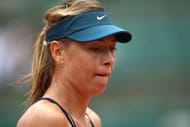Maria Sharapova once mentioned that she used to wear her fellow Russian tennis star Anna Kournikova's clothes.
Sharapova and Kournikova were both mentored by the late veteran coach Nick Bollettieri and were good friends during their early days. Sharapova began her training at Bollettieri's academy in Florida in 1996 at the age of nine, while Kournikova joined the institution in the early 1990s.
In her memoir 'Unstoppable: My Life So Far,' published in 2017, Sharapova shared that she frequently found herself wearing Kournikova's old clothes during their time at the academy. Interestingly, the two were often compared for their similar looks.
"In those early years, and I'm not exactly sure why, when I needed clothes, I often ended up with Kournikova's hand-me-downs, which - well, skintight animal prints are not usually my thing," Sharapova said (via WTA's official website).
Maria Sharapova secured five Grand Slam titles during her career, whereas Anna Kournikova did not win any. Sharapova's Major victories comprise the 2004 Wimbledon Championships, 2008 Australian Open, 2006 US Open and the French Open in 2012 and 2014.
Kournikova didn't win any singles titles, but in 2000, she reached the World No. 8 ranking. Her real success came in doubles, winning the Australian Open twice in 1999 and 2002, with Martina Hingis as her partner.
Maria Sharapova on being separated from her mother for 2 years: "Was I lonely? Was I sad? I don't know"

Maria Sharapova was separated from her mother for about two years when she moved to the USA to train at the Nick Bollettieri Tennis Academy in Florida in 1994. She was just seven years old at the time.
Sharapova and her father, Yuri, were granted visas to leave Russia but unfortunately, her mother, Yelena, was not.
In her aforementioned memoir, the Russian icon reflected that being separated from her mother at such a young age contributed to her development as a formidable competitor on the tennis court.
"These early years toughened me up. In fact, I think they explain my character, the style of my game, my on-court persona, why I can be hard to beat," Sharapova wrote.
She added:
"Was I lonely? Was I sad? I don't know. This was my life and I had no other life to compare it to. I spoke to my mother once a week on the phone. The calls were short, because of the rates."
"She asked what I was doing and told me that she loved me. I don't really remember the conversations, but I do remember the letters. I wrote to her every day. I'd scribbled at the bottom: 'I love you, I love you, I love you'."
Maria Sharapova also shared the joy of being reunited with her mother later, describing it as the "happiest time of her life."
"This was maybe the happiest time of my life. You don't realise how much you've been missing someone until you have that person back."
